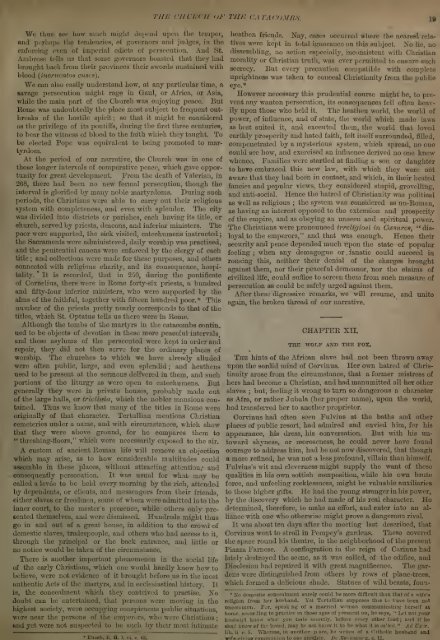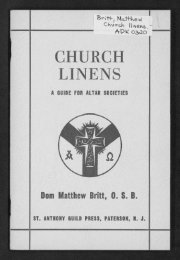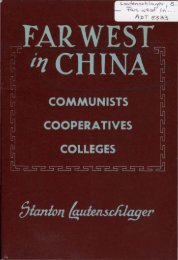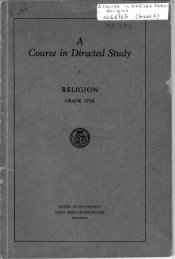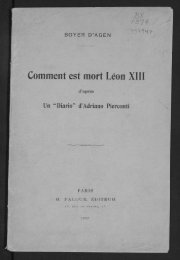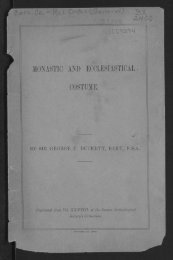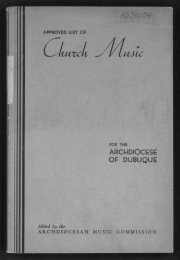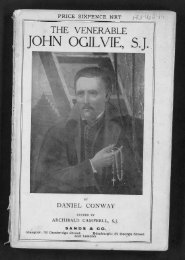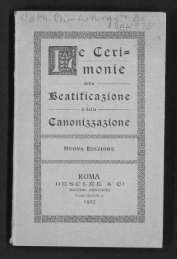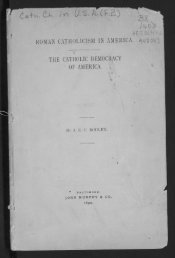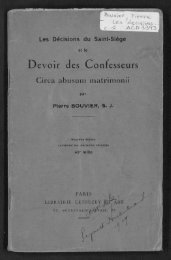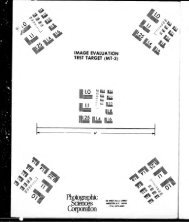- Page 5: PR 'fO SMR
- Page 8 and 9: oror coiirs. net ii. r jnirpoeo. .0
- Page 10 and 11: emu; to-J. ' hood ? Lneina broke tl
- Page 12 and 13: it ron shall, whether ;/" like it o
- Page 14 and 15: tion for a tableful of friends was
- Page 16 and 17: 10 : ; not to be obliged to wear th
- Page 18 and 19: 12 ; OR even searched, to Syrti's g
- Page 20 and 21: thnt is tlie musie Omt must accompa
- Page 22 and 23: into tho darkest rocossos of that g
- Page 26 and 27: 20 FABl'iLA : OR Mas. and artificia
- Page 28 and 29: house, haying entered by a cheat, d
- Page 30 and 31: some charitable brother, to have co
- Page 32 and 33: :.i I call it the soul, but thought
- Page 34 and 35: ChromnlirtB laughed ouh-krht, and s
- Page 36 and 37: 80 r\r.ii..\ on 1 perhaps bo laughe
- Page 38 and 39: IT, you will win it, whatever Fabio
- Page 40 and 41: PART SECOXD CONFLICT. CHAPTER I. TH
- Page 42 and 43: It is, that to-morrow at dawn, you
- Page 44 and 45: 38 These two ideas, which are combi
- Page 46 and 47: tions of his yet extant exhibit a p
- Page 48 and 49: therefore, she has always so much l
- Page 50 and 51: 44 FMtlul.A OR would be raised a Ch
- Page 52 and 53: FABIOLA ; "About him, tit least," w
- Page 54 and 55: FAJtIOLA : guided by national or pe
- Page 56 and 57: 60 1-A VIOLA; OR " "How 1 very inte
- Page 58 and 59: 52 FAlilOLA ; OR and mnst I be told
- Page 60 and 61: Jess to nttcm;>t describing; his as
- Page 62 and 63: B F.t/lIOf.A ; up, and assemble at
- Page 64 and 65: 58 FAltTOLA; OH he did not feo] " T
- Page 66 and 67: 60 The prefect mrtrtc a sicrnal to
- Page 68 and 69: 62 FABIOLA; OR the seal of the Chur
- Page 70 and 71: C4 FABTOLA; OR liiin. r, and other
- Page 72 and 73: 66 CHAPTEB XXL THE PRISON. IP a mod
- Page 74 and 75:
66 FABIOLA; OR streets, avoiding en
- Page 76 and 77:
70 more than others, like Him whom
- Page 78 and 79:
73 FABIOLA: OR month, and tasking T
- Page 80 and 81:
"THint dost them wrmt, TnVmln," he
- Page 82 and 83:
76 FA BIOLA; OR Every spendthrift h
- Page 84 and 85:
in her throat ? S"hr could not for
- Page 86 and 87:
80 FABIOLA ; OR " Then I fim a mine
- Page 88 and 89:
then calmly knelt down. With her ow
- Page 90 and 91:
FA 111OLA ; never been told of the
- Page 92 and 93:
me ! You have made me a. "oeggar, a
- Page 94 and 95:
88 FABIOLA ; OR " fulfil the first
- Page 96 and 97:
00 FMl [OLA; OR "T am, my child," t
- Page 98 and 99:
92 FABTOLA ; OR case of injury or o
- Page 100 and 101:
M F. \UH>1. A ; Of! PART THIRD VICT
- Page 102 and 103:
96 be applied to one who believes a
- Page 104 and 105:
99 FABIOLA; OR THE CHURCH OF THE CA
- Page 106 and 107:
" What is he thinking of?" I asked
- Page 108 and 109:
an appointment in India, or somethi
- Page 110 and 111:
6 " Exactly what I was going to say
- Page 112 and 113:
THE AUSTRALIAN DUKE OH THE NEW UTOP
- Page 114 and 115:
10 TJTE AUSTRALIAN olt TJIK XK\V I'
- Page 116 and 117:
TlIK M'STHM.IAX JU'KK o/t Till-: .Y
- Page 118 and 119:
"Well, but what about Werner ? is h
- Page 120 and 121:
16 THE AUSTRALIAN DUKE OK THE NEW U
- Page 122 and 123:
18 THE M'XTHMJAS DL'KE OR Till-: SK
- Page 124 and 125:
20 which deeply interested me. At l
- Page 126 and 127:
arch, catching the evening rays, an
- Page 128 and 129:
eottagp resiliences for giving a la
- Page 130 and 131:
26 THE A VSTRALIAN D UKE OR THE NE
- Page 132 and 133:
THE A USTRALIAN DUKE OR THE NEW UTO
- Page 134:
'mnny of whom followed the example
- Page 138 and 139:
step became more pressing. Andrew h
- Page 140 and 141:
fellow has been found asleep among
- Page 142 and 143:
"You're surprised that I know your
- Page 144 and 145:
ml did he distinguish, but with the
- Page 146 and 147:
\t male hi-ir ! THE .1 r,s77,.l/,/.
- Page 148 and 149:
12 out it, font with tenfold vividn
- Page 150 and 151:
li THE VISION OF OLD ANDREW THE WEA
- Page 152 and 153:
16 THE VISION OF OLD ANDREW THE WEA
- Page 154 and 155:
ook bad fallen frsm his hand and wa
- Page 156 and 157:
THE TWO VIC had nerer learnt how to
- Page 158 and 159:
self. For, he that eateth and drink
- Page 160 and 161:
Till-: T\VO Simper cannot help thin
- Page 162 and 163:
10 TUI: TWO ,. vinced, and IIP long
- Page 164 and 165:
12 Tin: T\VU oil my love nn3 tender
- Page 166 and 167:
they snt, and after n moment's sile
- Page 168 and 169:
' 16 THE TWO VICTORIES. there he no
- Page 170 and 171:
18 THE TWO VICTORIES. vant knocked
- Page 172 and 173:
20 THE TWO VICTORIES. And thus he f
- Page 174 and 175:
of bis bed, find ho beckoned the ol
- Page 176 and 177:
struck him, no ra.itter how nnjnst
- Page 178 and 179:
chased for her. Four roars later, w
- Page 180 and 181:
28 TUK WoL'SflKl) GRENADIER. The fo
- Page 182 and 183:
30 years they had worked iu jewellr
- Page 185 and 186:
THE STRAW-CUTTER'S DAUGHTER, CHAPTE
- Page 187 and 188:
THE STltA W-CUTTER'S DA UQHTER. 3 s
- Page 189 and 190:
" Chanteflenr is my second mother."
- Page 191 and 192:
TUK Aw,'. i ir-rr'r7'A71",v eulty q
- Page 193 and 194:
"Your reasons ?" asked the farmer.
- Page 195 and 196:
conduct. The doctor gave good hopes
- Page 197 and 198:
mailing in his hopeless remorse fro
- Page 199 and 200:
The Five. Franc Piece. TOWAEDS the
- Page 201 and 202:
THE PORTRAIT IN MY UNCLE'S DINING-R
- Page 203 and 204:
Till-: roUTHMT IX MY (!N
- Page 205 and 206:
7A r MY hond proof, and a firm unhe
- Page 207 and 208:
77//v PORTRAIT IN MY UNCLE'S DINING
- Page 209 and 210:
'///: I'D STRAIT J.\' .i/r staff,'
- Page 211 and 212:
THE PORTRAIT IN MY UNCLE'S DINING-R
- Page 213 and 214:
THE PORTRAIT IN MY {/ATA A" A" 7>/A
- Page 215 and 216:
THE PORTRAIT IN MY UNCLE'S DINING-R
- Page 217 and 218:
* ,'iins been carried off,' he said
- Page 219 and 220:
Till-: J'OHTHAJT 1\ MY l'.\'ci,K'X
- Page 221 and 222:
THE PORTRAIT IN MY UNCLE'S 21 asked
- Page 223 and 224:
TilK PORTRAIT IN MY UNCLE'S DININd-
- Page 225 and 226:
THE rOHTUMT /A r MY UNCLE'S hp said
- Page 227 and 228:
the insult to the lion's mane. Fred
- Page 229 and 230:
mire the magnificent panorama which
- Page 231 and 232:
the chaplain. "At whatever hour he
- Page 233 and 234:
TYBORNE: AND WHO WENT THERE IN THE
- Page 235 and 236:
CHAPTEE H. " The rod they tako so c
- Page 237 and 238:
Alice's pale cheeks grow paler stil
- Page 239 and 240:
" Oh, no ; that is, not the present
- Page 241 and 242:
"Well, said Mary, with unwearied sw
- Page 243 and 244:
her hands, her eyes fixed on Walter
- Page 245 and 246:
he was to serve Father Mordaunt's m
- Page 247 and 248:
golden tresses falling on the fair
- Page 249 and 250:
How Viscount R giiier first persuad
- Page 251 and 252:
TfDOliNE. But," said Blanche, looki
- Page 253 and 254:
Lnmb of God that taketh away the si
- Page 255 and 256:
same beams fell strnngoly among the
- Page 257 and 258:
the duchess herself, her sunny hair
- Page 259 and 260:
me the agony of seeing yon again, o
- Page 261 and 262:
ishop, with a vast concourse of cle
- Page 263 and 264:
" Replace the wood under his feet,"
- Page 265 and 266:
priests : but I am no traitor. And
- Page 267 and 268:
passages into tho free air. The lad
- Page 269 and 270:
than Elizabeth would have desired A
- Page 271 and 272:
living in His fear, and dying in Hi
- Page 273 and 274:
up that this boon might be granted.
- Page 275 and 276:
tibVshpda honso cf business in Engl
- Page 277 and 278:
'HIE BLIXD \ OF who could do nothin
- Page 279 and 280:
great action in a Christian's life,
- Page 281 and 282:
THE NOTARY'S DAUGHTER." CHAPTER I.
- Page 283 and 284:
tin . 1 You I know the fact, but I
- Page 285 and 286:
. de though I do not shoot much, an
- Page 287 and 288:
THE NOTARY'* went into his study wi
- Page 289 and 290:
is like, and the sort of society th
- Page 291 and 292:
to know that at her age it was only
- Page 293 and 294:
young gentleman would make a very g
- Page 295 and 296:
as if it had never been, except as
- Page 297 and 298:
npt, :i fe-.v words which had been
- Page 299 and 300:
to-morrow. He wants the East Farm f
- Page 301 and 302:
" Are you speaking quite in earnest
- Page 303 and 304:
gr,-at surprise of Vinrent, who was
- Page 305 and 306:
nnce to his will. Like many women o
- Page 307 and 308:
way, it would be out of our road,"
- Page 309 and 310:
would see Denise, that he would pou
- Page 311 and 312:
'Then that would put oft the marria
- Page 313 and 314:
THE T'S l>.\ I li Kose's room v, :s
- Page 315 and 316:
..inied. George looked, as usual, v
- Page 317 and 318:
Bboul y, ,i ; and Rose wond- ndrd t
- Page 319 and 320:
1 with coM, distant, civility, ami
- Page 321 and 322:
Benoite. She was ashamed at fooling
- Page 323 and 324:
were thrust Into a waste-paper bask
- Page 325 and 326:
"Aunt Mode, don't cry. You will not
- Page 327 and 328:
, wife, and he. had rejected HIT. I
- Page 329 and 330:
Ised me Hint if I came to the Chape
- Page 331 and 332:
quiet stillness of tho olive nnd or
- Page 333 and 334:
husband than he would otherwise; ha
- Page 335 and 336:
M Lescalle resolved in his own mind
- Page 337:
The secret regarding the authorship
- Page 340 and 341:
Peuwarne was smiling. nl how many S
- Page 342 and 343:
It was not the first time th:;t Pet
- Page 344 and 345:
This was the way in which sympathy
- Page 346 and 347:
8 WRECKED AM) SAVKD. mercy of frien
- Page 348 and 349:
10 WRECKED A.VD XATKD. Tis(>fu'. Th
- Page 350 and 351:
12 D AND " Do yon ever think it all
- Page 352 and 353:
14 1 s9 they parted. As Peter came
- Page 354 and 355:
If, ni \ o-A i i.i). his nephew con
- Page 356 and 357:
WRECKED AJ\'l> JU VED. "I nm Borry,
- Page 358 and 359:
\ i m id : i the pretty little ball
- Page 360 and 361:
PART III. CHAPTER L Now in her hear
- Page 362 and 363:
Wliilc this wns going on in the sit
- Page 364 and 365:
" TVs is whnt I would mlvise you to
- Page 366 and 367:
I !hat end ns expressions of Mr. li
- Page 368 and 369:
30 AND XA "Yes, two." i you remembe
- Page 370 and 371:
And whatever favor lie had gained b
- Page 372 and 373:
.i.i\n thorn, prenllr, it must ho o
- Page 374 and 375:
J1LLVJ) to c:o forth from her body
- Page 376 and 377:
the wisdom so often withhold from t
- Page 378 and 379:
led : " As the Signora already know
- Page 380 and 381:
10 BLIXD A ' tie, which had 'all 'i
- Page 382 and 383:
12 ; ' led, and wo it would be a wa
- Page 384 and 385:
14 At ; and i coming when the wealt
- Page 386 and 387:
16 CHAPTER IV. Ave Mary ! night ts
- Page 388 and 389:
i is He will no) even give up his m
- Page 390 and 391:
20 but (hoy worn now floating upon
- Page 392 and 393:
mpanied by the men from whom ho hiu
- Page 394 and 395:
Ilf.fXD AGb Tlu> 's lirow grew dark
- Page 396 and 397:
2C "n of that God whoso path sho .
- Page 398 and 399:
ipie-d ; upon (1 lint the sea i , ,
- Page 400 and 401:
so Jil.iM) illi ynur corporal visio
- Page 402 and 403:
ye, I nud romem' request JiLlM> of
- Page 404 and 405:
he ran awny. and was supposed to ha
- Page 406 and 407:
evelry. Rut these hours of relaxati
- Page 408 and 409:
6 TI;I:K TO Tt; for a moment, and t
- Page 410 and 411:
8 /; TO TRl'.^T. Then arc you, Kate
- Page 412 and 413:
with her waiting-women, and she wil
- Page 414 and 415:
Cm put Buoh ready faith in mere rep
- Page 416 and 417:
\vork lo ilo fur her at home, they
- Page 418 and 419:
un: m TI, Ood'B goodness; and it is
- Page 420 and 421:
16 Tlil'l-: Til 77. Ood's goodness;
- Page 422 and 423:
18 TUL'K TO and go on to the end yo
- Page 424 and 425:
90 TO .77.TN7'. cape, and that of L
- Page 426 and 427:
TRUE TO r/, Cuthbert's words had di
- Page 428 and 429:
24 mm TO TitrST. erine, for the pre
- Page 430 and 431:
Tlil I-! TO TU :;cally from the cen
- Page 432 and 433:
cure :i solid Catholic education fo
- Page 434 and 435:
As ii is n.it our intention to foll
- Page 436 and 437:
autiful nnd so free from care. What
- Page 438 and 439:
emarkable feature. The expression o
- Page 440 and 441:
fore, that all whom the fever hail
- Page 442 and 443:
manifold transgressions. But how fe
- Page 444 and 445:
40 TUL'H TO TliL'^T. But be not afr
- Page 446 and 447:
i of tin; old Idlers, prevented her
- Page 448 and 449:
41 Tin i-: r r KM' >mptroller ants.
- Page 450 and 451:
4 TRUE TO 77. As Lady Adelina enter
- Page 452 and 453:
manner in which Catherine replied,
- Page 454 and 455:
gin.; < were happy IIMCS for Cather
- Page 456 and 457:
windows, glad to remain unnoticed w
- Page 458 and 459:
la few months after his arrest Mr A
- Page 460 and 461:
ward to look on him as a distant co
- Page 462 and 463:
.1 Don ' {,'rii'f so as not to heig
- Page 464 and 465:
i-y bull i left the dark ' whither
- Page 466 and 467:
V i\v we cannot doubt it any lunger
- Page 468 and 469:
8 A norm,!-: Italy ought to bo Ital
- Page 470 and 471:
10 : x.irr /// me ! How can I belie
- Page 472 and 473:
I f.f i' ; but I'd he ]iv nder stil
- Page 474 and 475:
II letter to his cousin's. " We hav
- Page 476 and 477:
Ifi . Bomb' had admired that very d
- Page 478 and 479:
18 A D Ciarihaldiau Wands thoroughl
- Page 480 and 481:
20 hour of justice, were it only a
- Page 482 and 483:
A DOUBLE tiou half dead by terror,
- Page 484 and 485:
A Del n/.l- SACRIFICE. Victor's fat
- Page 486 and 487:
26 Ol'BLE And the old purtrd, w i f
- Page 488 and 489:
vil'Xl son ; you'll return lo Clod
- Page 490 and 491:
scarcely was I left to mysolf than,
- Page 492 and 493:
ken-hearted lo.k. 'So my son is not
- Page 494 and 495:
34 A DOV1 CHAPTEK XIL CASTEfcFIDABD
- Page 496 and 497:
A DOVBLE SACRI1 upon our heels. Des
- Page 498 and 499:
" All ! n 1 ! ! my father, indeed,'
- Page 500 and 501:
"Goodnight, my dear children. You'v
- Page 502 and 503:
12 OVBLE s. ir '//// lo, whore the
- Page 504 and 505:
A DOl'BLE SACRIFICE. Ires so much t
- Page 506 and 507:
dreadful scone, turned towards Erne
- Page 508 and 509:
' i- neighbors or friends is ill, t
- Page 510 and 511:
And you'll ho r His holy will, moth
- Page 512 and 513:
submission, in her heroic tv instan
- Page 514 and 515:
M. i /;//;. inh> the water, and ret
- Page 516 and 517:
66 ./.< / "The trial then began. Ma
- Page 518 and 519:
58 TUI-: ,vyv>/.')' A r.Mi; v was t
- Page 520 and 521:
mind, and only supported the bunion
- Page 522 and 523:
fortmiritely, this at length became
- Page 524 and 525:
,4 the States of BnrBary. He died t
- Page 526 and 527:
groups in fervent worship, scarcely
- Page 528 and 529:
that, got in one night, looks, yon
- Page 530 and 531:
ti v///: LAM i- "/' '////: w their
- Page 532 and 533:
, u:id nor liis companion could tel
- Page 534 and 535:
triilinu, perhaps, in the eyes of s
- Page 536 and 537:
12 Tin: (.-'>!. !>h:.\ />///; i.v.i
- Page 538 and 539:
14 TUB GOLDEN PffKASANf. " Dear Ger
- Page 540 and 541:
16 " Adieu, my dear mother," said t
- Page 542 and 543:
CHAPTER I. THE YOUTHFUL CAPTIYE. A.
- Page 544 and 545:
Seraphica was again alone; she refl
- Page 546 and 547:
On one side could be seen fathers a
- Page 548 and 549:
costliest robes, and to seek from h
- Page 550 and 551:
iO will be time to change the Tow?
- Page 552 and 553:
LTDIA. at hearing such words from L
- Page 554 and 555:
14 rious mfen, they divided it into
- Page 556 and 557:
whole Roman : People in behalf of t
- Page 558 and 559:
IS /, Y 1) 1 A. eyes when she saw t
- Page 560 and 561:
with the words: "From the camp ; Lu
- Page 562 and 563:
23 L TDIA. God, and of the same nat
- Page 564 and 565:
at Athens. On the sixth day, the ch
- Page 566 and 567:
2(5 bestow " a charity with her own
- Page 568 and 569:
L, r she began to look impatiently
- Page 570 and 571:
30 /, ) 1)1 A. touched the bier. An
- Page 572 and 573:
y that most dignified of nil myster
- Page 574 and 575:
"Do so," replied Metella, " in Rome
- Page 576 and 577:
L TDIA. ivory sceptre headed with t
- Page 578 and 579:
38 L YDIA. or a pair of palm branch
- Page 580 and 581:
40 LTBIA. before u* She then placed
- Page 582 and 583:
aasoling her companions to the enti
- Page 584 and 585:
irith him. Of course the Christians
- Page 586 and 587:
' 4ft to he recognized. The haughty
- Page 588:
-* k 7, . ' ^-7 ^ ^ /. / "


